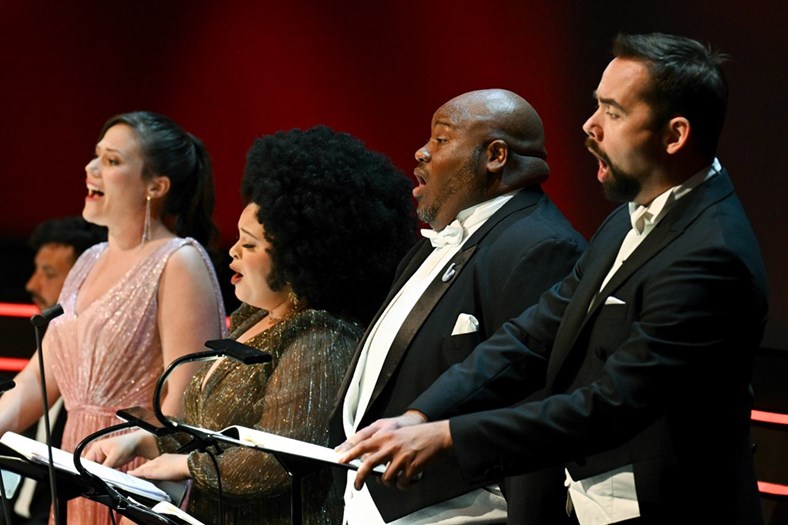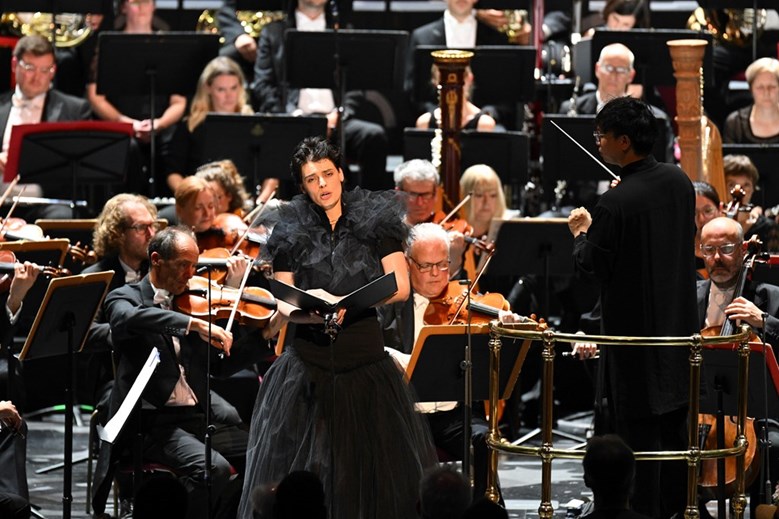THE BBC’s programming of works for the Henry Wood Proms at the Royal Albert Hall in London will never satisfy everybody. I would question the inclusion of some concerts that are hardly appropriate for what the Corporation calls “the world’s greatest classical music festival”. And, suitable though their symphonies are for the vast spaces of the hall, there has been rather a lot of Mahler and Shostakovich recently.
But, this year, the BBC has done well by the greatest symphonist of all, Ludwig van Beethoven, by scheduling all but one of the odd-numbered masterpieces. (Could they not have found room for No. 1?) I heard the first one on Radio 3. On 28 July, Ryan Wigglesworth conducted the BBC Scottish Symphony Orchestra in the “Eroica”. He gave due emphasis to the crashing, repeated discords in the first movement, and built up the second to a heartfelt climax.
No. 5, three days earlier, was shown on BBC4 on 2 August. Maxim Emelyanychev, conducting without a baton — increasingly the fashion nowadays — got a stirring performance from the Scottish Chamber Orchestra, thanks in part to the splendour of the natural (i.e. valveless) trumpets and horns; and the flowing tempo of the slow movement was just right.
On 6 August, Iván Fischer and the Budapest Festival Orchestra brought No. 7 with an unusual layout, the double basses ranged at the back, separated from the cellos by the woodwind and brass. Fischer’s subtle hesitation as minor moved to major in the Allegretto was a pleasure to witness.
Best of all the Beethoven symphonies was the annual performance of the Ninth on 21 August. I thought some of it too fast; but, seeing it the next day on BBC4, I found myself completely won over. Fabio Luisi and the Danish National Symphony Orchestra were powerful, almost apocalyptic at the climax of the first movement, the timpani particularly thunderous — why, one wonders, did Beethoven not bring in the trombones? — and there was a spectral quality to the woodwind in the Scherzo. The first statement of the “Joy” tune was the merest whisper. The Danish National Concert Choir (chorus-master Poul Emborg) and the four soloists were magnificent.
 Chris ChristodoulouThe vocal soloists in Beethoven’s Ninth Symphony in the Proms
Chris ChristodoulouThe vocal soloists in Beethoven’s Ninth Symphony in the Proms
Unlike last year, there have been no blockbuster choral concerts (but see below), though there was much to be enjoyed on a smaller scale. The first night on 18 July with BBC forces under Sakari Oramo, which I caught up with on BBC iPlayer, ended with Vaughan Williams’s Sancta Civitas, a 30-minute cantata from 1926. The imitative entries for the chorus seemed to me to owe something to Holst’s Hymn of Jesus. Gerald Finley, bass-baritone, sang with his customary authority and beauty of tone; poor Caspar Singh, tenor, had to wait for the merest cough and spit at the end.
The wonderful Estonian Philharmonic Chamber Choir honoured the 90th birthday of Arvo Pärt in a late-night concert on 31 July. Perhaps the most appealing of his pieces (there was also some Bach and Rachmaninov) was De profundis, with its accompaniment for organ and percussion; the most extraordinary item was Curse upon Iron by Veljo Tormis, with shouts and screams from the choir, and a shaman drum noisily beaten by the conductor, Tõnu Kaljuste.
Easier on the ear than this brutal piece was a programme of Italian Renaissance music, given on 17 August by the French group Le Concert Spirituel. The Mass Ecco sì beato giorno by Alessandro Striggio was interspersed with short pieces by other composers. To unusual but striking effect, in the contributions by Francesco Corteccia the plainchant was belted out fortissimo, while the other voices delivered their counterpoint in hushed tones. Unfortunately, the potential of four choirs (including brass) calling to one another from gallery to gallery was unexplored, the performers facing inwards in a hollow square.
Sir Mark Elder and the BBC Symphony Orchestra gave a terrific performance of Delius’s A Mass of Life — which, I suppose, could qualify as a blockbuster — on 18 August. Singing in German, the BBC Symphony Chorus and London Philharmonic Choir (chorus-masters Neil Ferris and Neville Creed) were exemplary.
I found it difficult to respond to Nietzsche’s windy text (from Also sprach Zarathustra); the tenor David Butt Philip waxed lyrical at “In dein Auge”; from my seat, Roderick Williams was hard to hear in the equally perfumed “Nacht ist es” (but he is eloquent on Elder’s recording with Bergen forces). The soundscape that introduces Part 2, though, with its horn calls, was magical.
On 22 August, Dalia Stasevska conducted the BBCSO in Górecki’s Symphony No. 3, Symphony of Sorrowful Songs. The first movement is beautifully shaped: it builds up gradually, starting with the double basses, the other strings entering in turn, before the soprano solo begins; then the process is reversed, the basses playing alone at the end. The whole piece, lasting nearly an hour, was grippingly sung by Francesca Chiejina.
 Chris ChristodoulouEmily D’Angelo sings in Mahler’s “Resurrection” Symphony, conducted by Kahchun Wong
Chris ChristodoulouEmily D’Angelo sings in Mahler’s “Resurrection” Symphony, conducted by Kahchun Wong
I caught Mahler’s Second Symphony, “Resurrection”, on Radio 3 (2 August). It marked the Proms debut of Kahchun Wong, chief conductor of the Hallé since last year. He displayed a notable attention to the detail, and the peroration must have sounded overwhelming in the hall. Emily D’Angelo was billed as a mezzo-soprano, but the richness of her singing in “Urlicht” proclaimed her as a real contralto.
Mahler’s Symphony No. 3 was performed on 11 August by the BBC National Orchestra of Wales under Ryan Bancroft. The CBSO Children’s and Youth Choruses, and the upper voices of the orchestra’s chorus (chorus-master Adrian Partington) were impressive; but the hold-your-breath moment came at the start of the slow last movement, the strings a thread of sound.
Mahler’s Fifth Symphony, also no stranger to the Proms, afforded the opportunity on 23 August of admiring the rich sound of the Royal Concertgebouw Orchestra, conducted by Klaus Mäkelä, their Chief Conductor designate. It was preceded by “Rendering”, a rather jolly piece in which Luciano Berio played around with symphonic sketches by Schubert.
Of the three operas on offer, I missed Puccini’s Suor Angelica (19 August). Bartók’s grim one-acter, Duke Bluebeard’s Castle, was paired with the Beethoven No. 7 mentioned above. It was a shame that the mighty Albert Hall organ was not deployed at the opening of the fifth door. But the highest praise is due to Dorottya Láng as Judith and Krisztián Cser as Bluebeard; and how wonderful that Iván Fischer recited the opening narration from memory while still controlling the orchestra!
It is hard to write temperately about the performance from Glyndebourne on 27 August of The Marriage of Figaro. It was cleverly semi-staged — costumes and a few props — and, as you would expect, the cast performed as a well-honed ensemble, the Count Almaviva of Huw Montague Rendall first among equals. The audience loved it. But I have never heard such unidiomatic, wilful conducting of a Mozart opera. It was not, of course, incompetent: just wrong-headed. Riccardo Minasi pulled the phrases around and interrupted the impetus of the music by indulging in otiose pauses within the numbers. He encouraged the timpanist to play as if going into battle. I have other gripes, but I will stop there.
So, not to end on a curmudgeonly note: the playing of Sir András Schiff of Bach’s The Art of Fugue on the morning of 23 August was sublime. For an hour and 20 minutes, complemented briefly by Schaghajegh Nosrati on a second piano, he delineated the fugal “voices” with clarity and warmth. Wonderful!
To be continued. All the Proms can be heard on BBC Sounds for 44 days; those that were televised can be watched on BBC iPlayer till mid-2026.















